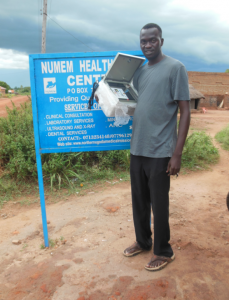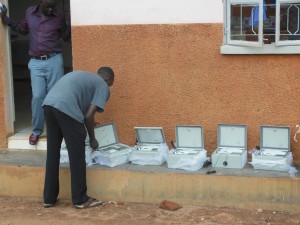Mark Beckford of nComputing wrote a great article about Open Mind - Question Box.Essentially, he explains how Question Box vaults over the slow bandwidth speeds found in most of Sub-Saharan Africa.
Read the original post, or read it after the jump:

Mark Beckford
October 8, 2009 — 06:00 am
Question Box in India
A Simple Solution for the Information Divide
I guarantee that anybody reading this blog takes for granted the wealth of information at their fingertips. Looking for something? Google it.
But for the billions of of people in the developing world that don't even have a mobile phone, what do they do?
Last year at SoCAP '08 I met a young woman with an intriguing social venture called Open Mind. She had attended the panel I was hosting on ICT for Development and approached me after the session about a project called Question Box. Her name was Rose Shuman and she had an idea for a free telephone hotline service to bring information to those in the developing world that don't have access to a phone or computer.
 The value proposition she presented was remarkably simple: put a box in rural communities where people don't have fixed-line or mobile phone service. They just push a button and are connected to an operator who has a PC with an internet connection. The operator can look up the question using the internet and provide that information for free.
The value proposition she presented was remarkably simple: put a box in rural communities where people don't have fixed-line or mobile phone service. They just push a button and are connected to an operator who has a PC with an internet connection. The operator can look up the question using the internet and provide that information for free.
She was looking for feedback on the idea, and if I recall correctly, I believe I told her I saw two potential obstacles. The first was the ability to scale a non-profit project that was dependent on manufacturing and deploying these devices to villages across India. The second was the proliferation of the mobile phone and how she could tap into that device as a way to deploy the service. Both of these had to do with getting the business model right.
I hadn't talked to her about the project since then, but last week she forwarded me an article about Question Box in the New York Times. She has since partnered with the Grameen Foundation and has received funding from the Bill and Melinda Gates Foundation, so I'm happy to see her finding early successes.
She has expanded this service to Africa. In Uganda, they had to modify the service away from a device-centric model to a mobile-phone centric model. Africa has terrible broadband connectivity. Wayan Vota, who writes and manages the OLPCNews and Education Technology Debate blogs, sent me this screen shot of his broadband speed in Nigeria:
As you can see above, he was getting modem speeds of around 14.4 to 28.8 kbps. Open Mind thus decided to hire Question Box "agents" who have mobile phones and wear prominent shirts in order to identify them.
 These agents then phone into the a call center in a central location with decent broadband connectivity and ask the question on behalf of the individual. The agents get compensated with free cellphone air time. They plan to expand the service to existing mobile phone users who can text or call the center directly.
These agents then phone into the a call center in a central location with decent broadband connectivity and ask the question on behalf of the individual. The agents get compensated with free cellphone air time. They plan to expand the service to existing mobile phone users who can text or call the center directly.
A new similar service recently cropped in the US cryptically called KGB. You text a question to 542542 (which is KGBKGB on your phone key pad) and for 99 cents they text you back the answer. The service wasn't that impressive when I tried it out specifically for this article. I asked the question: "Are there other similar services like KGB in developing countries like India?" The unhelpful answer was: "KGB does have simmular services in other countries but we do not divulge the mane of the services." That is not my incorrect spelling, that answer is verbatim from my mobile phone. And there are other services.
I have often discussed the three requirements of a disruptive innovation. It must be simple, easy to use, and provide a unique value to the user. And to be successful, it needs to adopt a business model that works for that specific user group. Rose's venture meets all of these requirements, especially in simplicity.
You can't get much simpler than a service that requires you to just push a button.






 The value proposition she presented was remarkably simple: put a box in rural communities where people don't have fixed-line or mobile phone service. They just push a button and are connected to an operator who has a PC with an internet connection. The operator can look up the question using the internet and provide that information for free.
The value proposition she presented was remarkably simple: put a box in rural communities where people don't have fixed-line or mobile phone service. They just push a button and are connected to an operator who has a PC with an internet connection. The operator can look up the question using the internet and provide that information for free.
 These agents then phone into the a call center in a central location with decent broadband connectivity and ask the question on behalf of the individual. The agents get compensated with free cellphone air time. They plan to expand the service to existing mobile phone users who can text or call the center directly.
These agents then phone into the a call center in a central location with decent broadband connectivity and ask the question on behalf of the individual. The agents get compensated with free cellphone air time. They plan to expand the service to existing mobile phone users who can text or call the center directly.
